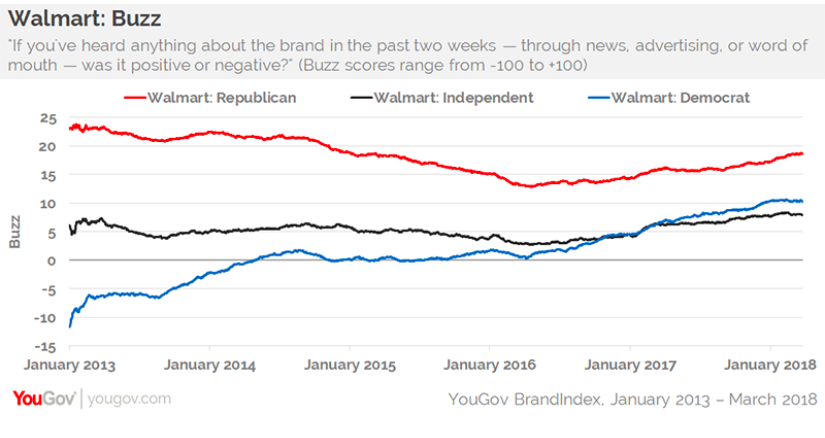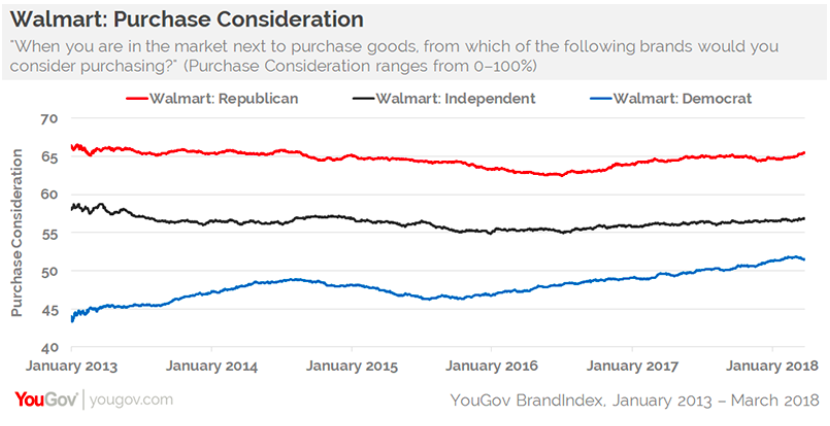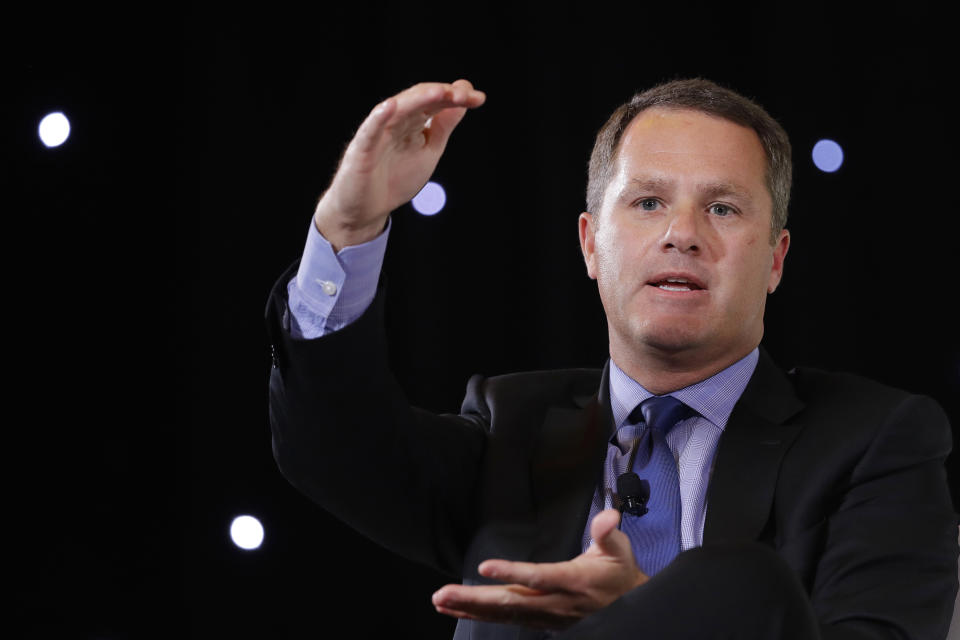Walmart is becoming more popular with Democrat shoppers
Walmart (WMT), the world’s largest retailer known for its “everyday low price,” has become more popular with Democrats in the U.S. in the last five years, according to new data released by YouGov BrandIndex, a global market research company.
Five years ago, Democratic shoppers held a negative view of Walmart, while Republican shoppers were positive and Independents were mildly positive, according to YouGov.
In early 2013, only 43% of Democrats surveyed were considering shopping at Walmart, compared to 52% as of March 25, 2018. Meanwhile, 66% of Republican shoppers polled in January 2013 were considering making a purchase at Walmart, with that number trending slightly downward to 63% in July 2016 and moving back up to 65% today, the data show. Independents have remained steady at about 57% over that period.


“Big picture — I say Walmart has done a reasonably good job building support among consumers who identify as democratic and it hasn’t lost too much ground among conservatives,” YouGov BrandIndex’s CEO Ted Marzilli told Yahoo Finance.
Marzilli pointed that Walmart, headquartered in Bentonville, Ark., has historically held a significant footprint in the southeastern part of the U.S., which tends to lean more conservative politically. The retailer also appeared in more rural areas, he noted. That said, Walmart has been expanding into more urban areas.
What’s noteworthy about the last five years is that Walmart has also made some public stances on some political issues that would likely resonate with Democrats.
For instance, in the aftermath of the school shooting in Parkland, Florida, Walmart raised the age to purchase firearms and ammunition to 21. The retailer said it would remove items resembling assault-style rifles, including nonlethal airlift guns and toys, from its website. In 2015, Walmart stopped selling modern sporting rifles, including the AR-15.

Last fall, following the white supremacist rallies in Charlottesville, CEO Doug McMillon sent a memo to Walmart’s employees criticizing President Trump’s response to the violence.
“As we watched the events and the response from President Trump over the weekend, we too felt that he missed a critical opportunity to help bring our country together by unequivocally rejecting the appalling actions of white supremacists,” McMillon wrote at the time.
Going back even further, in April 2015, McMillon joined other CEOs in opposing “religious freedom” bills, which could lead to discrimination against the LGBT community. Walmart publicly shared statements from McMillon asking Governor Hutchinson to veto the HB1228 in Arkansas, saying that it “threatens to undermine the spirit of inclusion present throughout the state of Arkansas and does not reflect the values we proudly uphold.”

Walmart, the biggest private employer in the U.S., also increased the minimum wage for half a million employees in back 2015 to $9. A year later, the company raised it to $10. This year, following tax reform, Walmart boosted its hourly wage to $11 per hour.
Consumers can associate CEOs with the brands and companies that they run, and this affiliation can be much stronger when the CEO is also a founder of a company, according to Marzilli.
“When CEOs speak out like this they essentially are the mouthpiece for their company, so it absolutely is a reflection of the brand it carries a lot of risks and a lot of rewards,” says Marzilli.
Marzilli noted that the data from consumers compiled by YouGov would suggest that McMillon has done a “pretty good job” where he’s waded into the political or social debate.
A representative for Walmart didn’t immediately respond to a request for comment at the time of publication.
For its surveys, YouGov BrandIndex draws from 2.2 million people in the U.S. who ages 18 and up. Its panelist community is roughly split into thirds when it comes to political affiliations, according to Marzilli.
Each day, YouGov interviews about 5,000 people, gathering their opinions on 1,600 consumer brands. The surveys are continuous and ongoing. Panelists answer questions about the buzz surrounding the company in the prior two weeks that can be positive or negative. They’re asked to consider news, advertising, and things they hear from friends and family about the brand.
Walmart is not a client of YouGov.
—
Julia La Roche is a finance reporter at Yahoo Finance. Follow her on Twitter.
